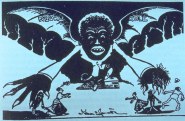|
|
 |
 |
|
Reading Guide |
| 4. |
The Vote
| - | William J. Whipper, Statement to the South Carolina Constitutional Convention, 1895, excerpts |
| - | "Negro Rule," The [Raleigh, N.C.] News and Observer, cartoon, 27 September 1898 |
|
|
 |
From the moment in 1870 that the 15th Amendment granted black men the right to vote, southern states blocked its implementation. This process escalated after 1890 as the frenzy of "white supremacy" took hold in the South. State by state, voting limits were enacted that technically bypassed the 15th Amendment, and by 1910 the electoral voice of blacks was eliminated from the South. The devices included property requirements, multiple ballot boxes (set up to confuse the uneducated voter), poll taxes (to be paid months in advance), and literacy tests. To pass a literacy test, one had to interpret a section of the state constitution to the satisfaction of an official, whose standards would be prejudicially high for black voters. Illiterate whites could bypass the test due to the infamous "grandfather clause," which waived the requirement for persons whose grandfathers had been eligible to vote on January 1, 1867, i.e., white men only. In twenty years, disenfranchisement in the South was complete: Mississippi (1890), Tennessee (1892), Arkansas (1893), South Carolina (1895), Louisiana (1898), North Carolina (1900), Alabama (1901), Virginia (1902), Texas (1905), Georgia (1908), Oklahoma (1910), and Florida (1880-1910).
To sense how vehemently white supremacy was advanced, study the cartoon "Negro Rule," which was published on Independence Day, 1900, in North Carolina. Black leaders tried to counter the movement, as we read in William Whipper's forceful statement to the South Carolina constitutional convention in 1895. "Stay your hand and do justice," he says, but his appeal was for naught. (The quoted lines at the end of his speech are from John Greenleaf Whittier's "Song of the Negro Boatmen," 1862. A few months earlier Booker T. Washington had quoted the lines in his Atlanta Exposition speech.) Two short documents that capture the ferment of the times. 4 pages.
Discussion questions
- What is the threat of "Negro rule" as depicted in the newspaper cartoon?
- Why is "negro rule" not a threat, according to William Whipper? How does he appeal to his hostile white audience to maintain the black vote?
- What moral force underpins his appeal? Why does he speak when he will not "change a single vote?"
- How does he affirm the "manhood" of blacks while acknowledging to his white audience that "the negroes are yours?"
- What will provide hope and direction to black leaders after the sweep of disenfranchisement in the South? What political action is available to them?
|
» Link |
 |
 |
Topic Framing Questions
| • |
What forms of political action did African Americans initiate? For what goals? |
| • |
How was political action affected by the increase in discrimination and violence during the 1890s? |
| • |
How did black leaders frame their political objectives for their white audience? |
| • |
To what extent did black political action affect the lives of ordinary African Americans? |
|
|
 |
 |
|
 |
